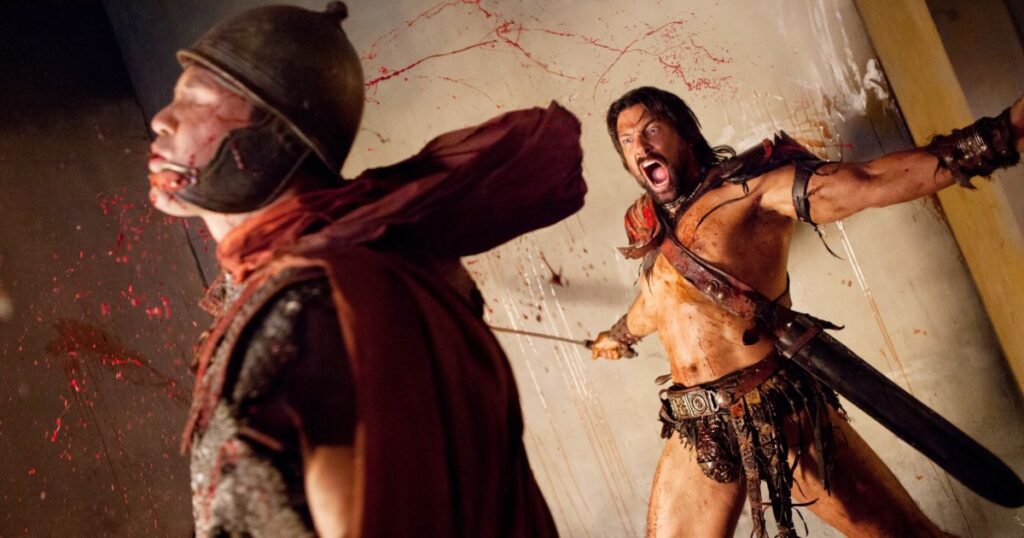Netflix subscribers have been able to enjoy Starz’ Outlander original series for years. But this month, Starz is sending over its other signature show, Spartacus.
The series is loosely based on the Roman slave rebellion from 73 to 71 BC that was led by a gladiator named Spartacus.
That story has been adapted before, but this incarnation of Spartacus captured the heart of its fans.
Now that this series is available for a wider audience, Watch With Us is sharing the four reasons to watch Spartacus on Netflix this fall.
It’s the Final Performance of Andy Whitfield
It’s impossible to talk about Spartacus without addressing the fate of its leading man, Andy Whitfield. After filming the first season, Whitfield was diagnosed with non-Hodgkin lymphoma and forced to vacate the role while seeking treatment. The prequel season, Gods of the Arena, was meant to give Whitfield time to recover his health. However, he passed away in 2011, just 18 months after his initial diagnosis.
Whitfield was a revelation as Spartacus in season 1, and he portrayed the character’s inner emotional life and fierce exterior with skill and charisma. This could have been the role that propelled Whitfield to even bigger things. Instead, it stands as his legacy. Liam McIntyre took over the part of Spartacus for seasons 3 and 4, and he was good in the role. But this remains Whitfield’s show, even after his death.
The Supporting Characters Are Very Compelling
Spartacus may be the main character of this series, but he’s not the only one who gets the spotlight in the ensemble cast. In the clip above, Gaius Claudius Glaber (Craig Parker) — the man who enslaved Spartacus — delivers a bitter rebuke to his wife, Ilithyia (Viva Bianca), following their estrangement in season 3. These are two of the show’s antagonists, and they still get that moment to air out their emotional grievances with each other.
The prequel season, Gods of the Arena, was a particularly effective showcase for Quintus Lentulus Batiatus (John Hannah) and his wife, Lucretia (Lucy Lawless), the antagonists from season 1. That story demonstrated that their love was real and showed audiences just how far they were willing to go to prove their devotion to each other. The gladiators were also given their due, especially Crixus (Manu Bennett) and his lover, Naevia (Lesley-Ann Brandt), as well as the story of Oenomaus (Peter Mensah), who tragically loses his beloved during the show’s run. This series made the audience care about these characters, especially when their lives were potentially on the line.
‘Spartacus’ Embraces Stylized Violence
The action in Spartacus may remind you of the movie 300 by director Zack Snyder (Justice League). Like that film, the show utilized slow motion and unusual camera movements during action. Spartacus also artfully displayed the bloodshed in the arena in oddly beautiful ways. It wasn’t simply a bloodbath for its own sake.
This unique style of action gave Spartacus a visual signature that made it stand out from contemporary shows. More impressively, it came out of the shadow of the 1960 Spartacus feature film that had been the most well-known version of this story until the show came along.
There’s a Spinoff Series Coming Soon
Historically, the fate of Spartacus is left to speculation. However, we do know how the story ended for the former gladiators-turned-revolutionaries. Let’s just say that there won’t be a sequel series, but that doesn’t mean the franchise can’t continue. This winter, Starz is launching a new spinoff called Spartacus: House of Ashur.
Nick E. Tarabay is reprising his role as Ashur, and the concept behind the show is that Spartacus’ rebellion was put down much more quickly in an alternate timeline. That allows Ashur to assume control over the Ludus — the gladiator training facility — and attempt to rise in Roman society. Starz hasn’t set a date for House of Ashur yet, but it feels like Spartacus‘ arrival on Netflix should help some new fans discover both the original series and its follow-up.
Spartacus is streaming on Netflix.
Read the full article here


